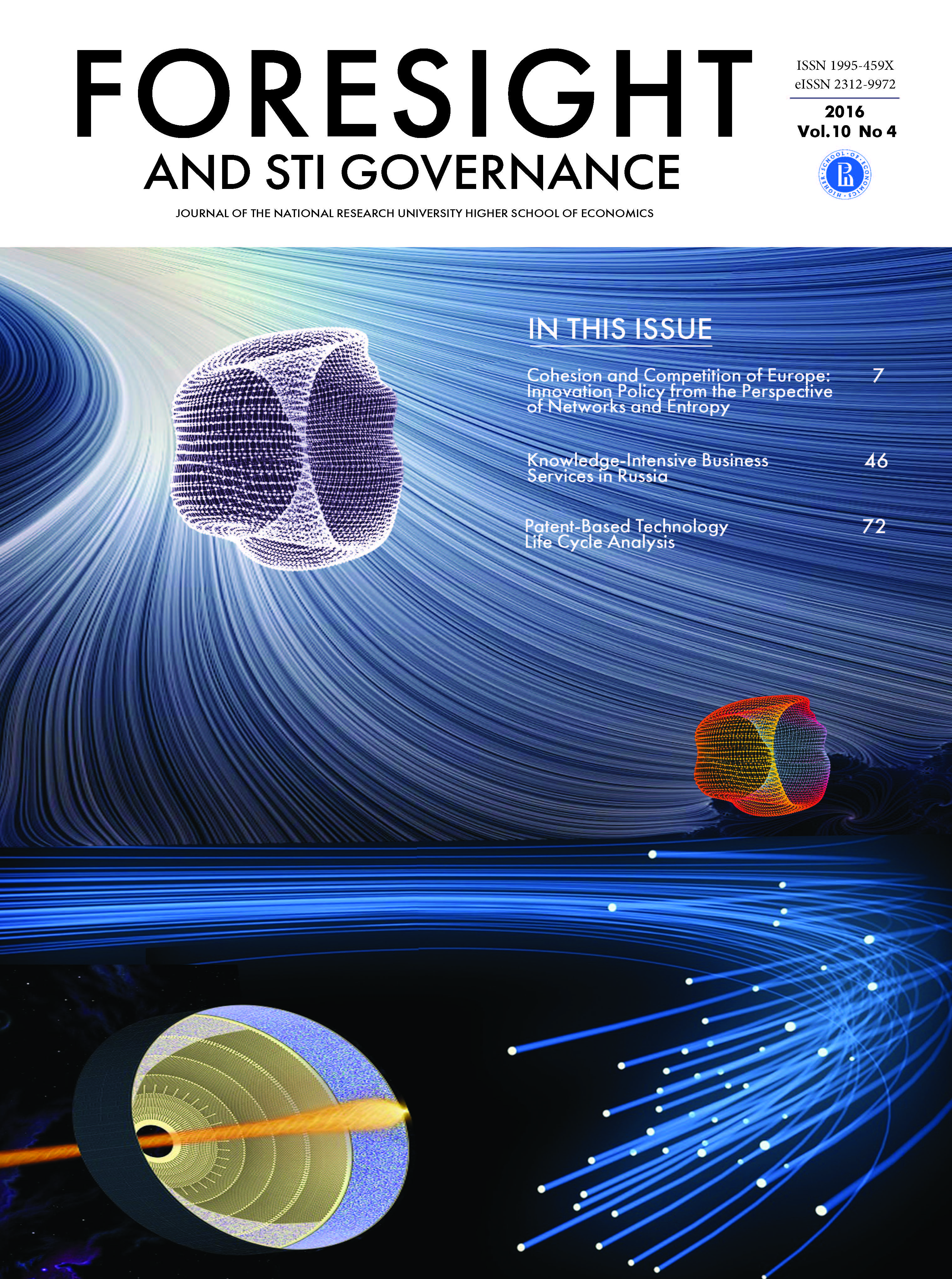Abstract
In recent years, knowledge-intensive business services (KIBS) have become extremely important in the knowledge-based economy. KIBS concentrate a well-qualified workforce and create high levels of value-added services, serve as a driver for the innovation-based development of many countries [Santos-Vijande et al., 2013]. However, the growth rates of this sector in Russia considerably fell after the 2008 crisis; some KIBS-industries could not even reach pre-crisis volumes of production and the share of this sector in GDP significantly declined [Berezin, Doroshenko, 2015]. The crisis trends in Russian economy at the end of 2014 and at the beginning of 2015 had a strong negative impact on KIBS. We show that the share of companies with decreasing revenues has dramatically grown in all industries. The demand side has also changed: the client base is now more unstable and customers more regularly fail to fulfill contract obligations. An industry analysis reveals significant divergences in the rates and trajectories for development of Russian KIBS industries. However, the sector heterogeneity might be also found in KIBS of other countries. The paper is based on both survey of 656 Russian KIBS producers and in-depth interviews with 24 leading KIBS experts.References
Asikainen A-L. (2015) Innovation modes and strategies in knowledge intensive business services // Service Business. Vol. 9. № 77. Р. 77-95.
Aslesen H.W., Isaksen A. (2010) Knowledge-Intensive Business Services as knowledge mediators in different regional contexts: The case of Norway // Knowledge-intensive business services: Geography and Innovation. Burlington, VT: Ashgate Publishing. P. 99-122.
Bettiol M., Di Maria E., Grandinetti R. (2011) Market extension and knowledge management strategies of knowledge-intensive business services // Knowledge Management Research & Practice. Vol. 9. P. 305-314.
Camacho J.A., Rodriguez M. (2008) Patterns of innovation in the service sector: Some insights from the Spanish innovation survey // Economics of Innovation and New Technology. Vol. 17. № 5. 459-471.
Charmaz K. (2006) Constructing grounded theory: A practical guide through qualitative analysis. Thousand Oaks, CA: Sage.
Consoli D., Elche-Hortelano D. (2010) Variety in the knowledge base of Knowledge Intensive Business Services // Research Policy. Vol. 39. P. 1303-1310.
Corrocher N., Cusmano L., Morrison A. (2009) Modes of innovation in knowledge-intensive business services evidence from Lombardy // Journal of Evolutionary Economics. Vol. 19. № 2. Р. 173-196.
Doloreux D., Freel M., Shearmur R. (2010) Introduction // Knowledge-intensive business services: Geography and Innovation. Burlington, VT: Ashgate Publishing. P. 1-18.
Doloreux D., Shearmur R. (2010) Exploring and comparing innovation patterns across different knowledge intensive business services // Economics of Innovation and New Technology. Vol. 19. № 7. Р. 605-625.
Doloreux D., Shearmur R. (2013) Innovation Strategies: Are Knowledge-Intensive Business Services Just Another Source of Information? // Industry and Innovation. Vol. 20. № 8. Р. 719-738.
Doroshenko M., Miles I., Vinogradov D. (2013) Knowledge intensive business services as generators of innovations. HSE WP BRP ‘Science, Technology and Innovation' № 12. Moscow: NRU Higher School of Economics.
Freel M. (2010) Knowledge-Intensive Business Services users and uses: Exploring the propensity to innovation-related cooperation with Knowledge-Intensive Business Services // Knowledge-intensive business services. Burlington, VT: Ashgate Publishing. P. 75-98.
Green J., Thorogood N. (2004) Qualitative methods for health research (1st ed.). London: SAGE Publications Ltd.
Griffin A., Hauser J. R. (1993) The voice of the customer // Marketing Science. Vol. 12. № 1. P. 1-27.
Marasco A., Masiello B., Izzo F. (2013) Client involvement and innovation in Creative-Intensive Business Services: A framework for exploring co-innovation in advertising agency-client relationships // Economies et Sociétés. Vol. 47. № 3-4. Р. 445-478.
Miles I. (1993) Bringing computer power to the consumer market // Technology Analysis & Strategic Management. Vol. 5. № 2. P. 151-172.
Muller E., Doloreux D. (2009) What we should know about knowledge-intensive business services // Technology in Society. Vol. 31. P. 64-72.
Muller E., Zenker A. (2001) Business services as actors of knowledge transformation: The role of KIBS in regional and national innovation systems // Research Policy. Vol. 30. № 9. P. 1501-1516.
Quandl (2016a) Services share of GDP by country (from World Bank cross country data). Режим доступа: https://www.quandl.com/collections/economics/services-share-of-gdp-by-country, дата обращения 02.05.2016.
Quandl (2016b) Services share of employment by country (from World Bank cross country data). Режим доступа: https://www.quandl.com/collections/economics/services-share-of-employment-by-country, дата обращения 02.05.2016.
Santos-Vijande M.L., González-Mieres C., López-Sánchez J.A. (2013) An assessment of innovativeness in KIBS: Implications on KIBS' co-creation culture, innovation capability, and performance // Journal of Business & Industrial Marketing. Vol. 28. P. 86-102.
Thomson S.B. (2011) Sample Size and Grounded. Theory // JOAAG. Vol. 5. № 1. Р. 45-52.
Zieba M. (2013) Knowledge-Intensive Business Services and their role in the knowledge-based economy. GUT Working Paper Series A (Economics, Management, Statistics) № 7/2013 (7). Gdansk: Gdansk University of Technology.
Березин И.С. (2016) Экспертные оценки объема и динамики рынков интеллектуальных услуг в России: 2005-2015 // Маркетинг в России. 2016. Справочник Гильдии маркетологов / Под общ. ред. И.С. Березина. М.: Гильдия маркетологов. С. 33-70.
Березин И.С., Дорошенко М.Е. (2015) Количественные и качественные изменения на рынке интеллектуальных услуг в России: 2005-2013 // Маркетинг в России. 2015 / Науч. ред. И.С. Березин. М.: Гильдия маркетологов. С. 85-128.
Дорошенко М., Майлс Й., Виноградов Д. (2014) Интеллектуальные деловые услуги: российский опыт // Форсайт. T. 8. № 4. C. 24-39.
Майлс Й. (2011) Сервисные инновации в XXI веке // Форсайт. Т. 5. № 2. С. 4-15.
Рождественская Е.Ю. (2012) Биографический метод в социологии. М.: НИУ ВШЭ.
Росстат (2016b) Цены. Режим доступа: http://www.gks.ru/wps/wcm/connect/rosstat_main/rosstat/ru/statistics/tariffs/#, дата обращения 02.05.2016.
Росстат (2016а) Национальные счета. Режим доступа: http://www.gks.ru/wps/wcm/connect/rosstat_main/rosstat/ru/statistics/accounts/#, дата обращения 02.05.2016.
ЦБ РФ (2016b) Обзор банковского сектора Российской Федерации (интернет-версия). Режим доступа: http://www.cbr.ru/analytics/bank_system/obs_1601.pdf, дата обращения 02.05.2016.
ЦБ РФ (2016а) Динамика официального курса заданной валюты. Режим доступа: http://www.cbr.ru/currency_base/dynamics.aspx, дата обращения 02.05.2016.

This work is licensed under a Creative Commons Attribution 4.0 International License.

